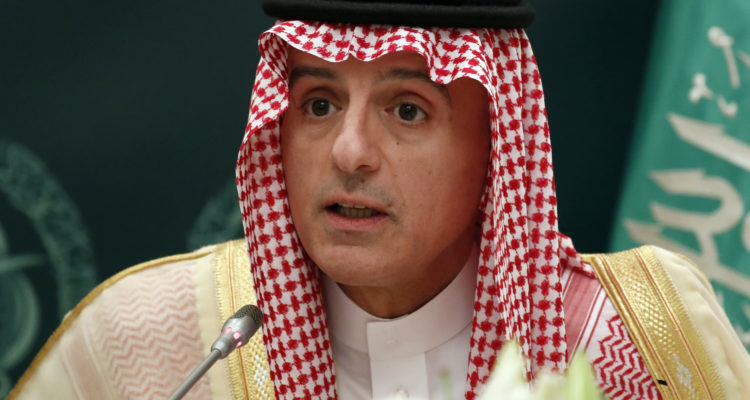According to a Lebanese website, regional peace deal includes settling Palestinian refugees outside Israel, no annexation of Jerusalem and Saudi/Israeli cooperation against Iran.
By: Yona Schnitzer/TPS
A secret correspondence between the Saudi Foreign Minister Adel Al Jubeir and Crown Prince Mohammed Bin Salman reveals the draft of a possible peace deal between Saudi Arabia and Israel, the Lebanese website Al-Akhbar claimed Tuesday.
Al-Akhbar posted what it said was the full text of the document which lists five basic principles supposedly agreed upon between Israel and Saudi Arabia, which would constitute the framework for a regional agreement and the end of the Arab Israeli conflict.
The five principles are:
- Jerusalem – “The Annexation of Jerusalem to international sovereignty as per the 1937 and 1947 partition plans – two international agreements which have recommended that the city not be annexed to either the Arab or Jewish entities.”
- Palestinian Refugees – “Saudi Arabia affirms its aspiration to settle Palestinian refugees in their countries of residence. The Kingdom can contribute to this effort by supporting innovative solutions such as cancelling the Arab League’s decision from the 1950s by which no Arab nation is to settle Palestinian refugees within their borders, as well as divert efforts to the redistribution and settlement of Palestinian refugees throughout the Arab states.”
- American Mediation and Agreed Upon Principles – “The United States and Saudi Arabia will reach agreements regarding the main principles for ending the conflict, after which President Trump would summon the foreign ministers of the region to a summit in order to obtain their agreements, and only after all have agreed to the same basic principals, would the actual negotiations begin.”
- Saudi Influence – “Saudi Arabia’s most effective and important role is to recruit others to support this deal, which will usher in a new era of peace and prosperity between Israel and the Arab and Muslim worlds. At first, normalization of relations with Israel will not enjoy wide public support throughout the Arab world, But Saudi Arabia believes that the combination of Israeli technology and the Gulf state’s economic power and energy markets could bring out the Middle East’s full potential and obtain peace, prosperity and stability.
- Iran – The Israeli-Palestinian conflict is the longest lasting conflict in the region. Over the years, it has served as a justification for the actions of extremists, and has also distracted the major players in the region from focusing on the central threat to its stability – Iran. In accordance to the deal, both Israel and Saudi Arabia must commit themselves to an effective cooperation in order to stop Iran.
The letter opens with a statement that Saudi Arabia is the most powerful and most important entity in the Arab world, and that any solution to the Israeli-Palestinian conflict must be supported by the Kingdom in order to gain legitimacy in the Arab world. It continued to state that dealing with Israel is extremely problematic in the eyes of the Arab world, and that the kingdom would only take such a risk if America was serious in its intentions to act against Iran, and stop them from destabilizing the region.
Furthermore, the letter stated that Israel is the only country in the Middle East possessing nuclear weapons, and that any relations between the two countries must be based on mutuality and a balance of power. To remedy this situation, the Saudis propose that either the Kingdom be allowed to obtain nuclear weapons, or alternatively, that Israel dismantle its arsenal.
According to the Lebanese report, the document was signed with the official seal of the Saudi Foreign Minister, however it did not post the original version of the document.
Speculation about a regional deal has been rife since US President Donald Trump’s visit to Saudi Arabia in May and was strengthened by Arab reports, since denied by Saudi officials, of a secret visit to Israel by the Crown Prince in September, where, according to reports, he met with Prime Minister Benjamin Netanyahu.





